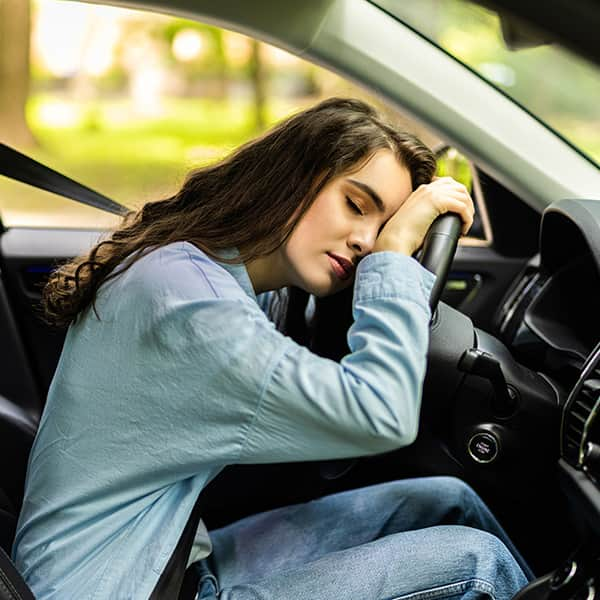
Drowsy driving has become as much of a concern on the road as drunk driving and distracted driving. Even though everyone agrees that fatigued driving is a bad idea, about one-third of Americans admit to driving when they were a little too tired. "If you're so tired that you can hardly keep your eyes open, you could fall asleep for just a few seconds and not realize it," said David Cloud, CEO of the National Sleep Foundation. "If that happens at 65 miles an hour, you could drive the length of a football field in an unconscious state." Being awake for more than 20 hours can be the equivalent of a blood alcohol concentration of 0.08%, which is the legal limit for intoxicated driving. And it's totally possible to doze off for a few seconds without even realizing it. Shift workers, commercial truck drivers, business travelers, and motorists under 25 are the most at-risk groups for drowsy driving. To arrive at your destination safely, these are the top 10 tips to avoid drowsy driving when you get behind the wheel.
Get a Good Night's Sleep
One of the best pieces of advice to avoid drowsy driving is to get a good night's rest the night before. This is especially a good tip if you have a long drive ahead of you or if you're traveling for the holidays. Around seven to nine hours of sleep is a good rule of thumb for most adults.
Take Frequent Driving Breaks
Whether you slept well the night before or not, most people could use a quick driving break about every 100 miles or two hours. Plan your trip to allow for frequent stops to get out, stretch your legs, and grab a snack or beverage. Remember, travel is best spent when the journey is about more than the just the destination!
Don't Be in a Rush
In order to save time for those spontaneous roadside jaunts, allow yourself some extra time. Not only does being in a rush make you less likely to take the driving breaks you need, it also puts you at a greater risk of accident and injury.
Avoid Driving Late at Night
If possible, avoid driving late at night, a time when most people become less alert and sleepier. If you work a second or third shift, avoid driving during the times that your body has become most accustomed to sleeping.
Switch Off with a Buddy
Drive with a passenger whenever you can to help yourself stay awake. If you are concerned about getting sleepy behind the wheel, ask your passenger to start up a conversation and take turns driving every couple hours.
Take a Quick Nap
If you are driving alone and feeling sleepy, pull off the road to a safe place to take a quick nap. If it's late at night, consider pulling into a hotel to stay overnight and start fresh in the morning.
Listen to Engaging Radio Programs
If you're driving alone or conversation has run dry with your passenger, flip on an engaging radio program to keep your mind active and alert. Whether you choose news, music, or an audio book, radio can be a great tool for combating drowsiness.
Drink a Caffeinated Beverage
For a quick fix, pull off the road and pick up a coffee, tea, soda, or energy drink at a gas station. But remember that it takes about a half hour for caffeine to enter the bloodstream and it might not help you much if you already consume it on a regular basis.
Avoid Alcohol and Medications that Cause Drowsiness
Not only does alcohol impair your judgment while driving, but it also makes you sleepy. Avoid drinking any alcoholic beverages at all if you are driving. Also stay away from prescription and over-the-counter medications known to cause drowsiness.
Take Care of Your Health
If you are experiencing regular trouble sleeping, consult your doctor to see what could be causing the problem. Sometimes minor symptoms of fatigue can be a sign of greater health issue, such as sleep apnea or narcolepsy.

